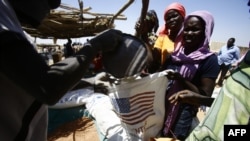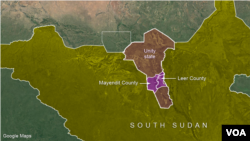Rising insecurity has forced 28 humanitarian workers to relocate from Mayendit, one of two counties in South Sudan's Unity State that three United Nations aid agencies and the government declared last month as famine-stricken.
“So this is basically an indication of just how volatile these areas continue to be,” said Gemma Connell, the deputy head of the U.N. Office for the Coordination of Humanitarian Affairs in South Sudan.
VOA’s South Sudan in Focus visited Leer county, the other area of Unity state that has been hit by famine, and found civilians who say they have survived on water lilies and wild fruits for the past three years. Villagers also told VOA they are unable to farm the land due to sporadic military attacks, and have been forced to live in the bush and swamps.
U.N. officials have described the famine as "man-made" — a result of an economic collapse and a civil war.
A U.N. statement listed a series of recent events, including violence, looting, and denial of humanitarian access in the regions of Upper Nile, Jonglei, and Central Equatoria that "hampered humanitarian operations and placed civilians at risk." The most recent of these events is the insecurity that caused the relocation of the aid workers from Unity State's Mayendit county.
“In the days subsequent to the incident, we have been negotiating intensively behind the scenes, in addition to the public advocacy, to make sure that we can get these aid workers back in as soon as possible, and we are hopeful, all things going well, that we can get them back on the ground in the coming days,” said Connell.
Connell says that food distributions for nearly 114,000 people had been completed in four locations across Mayendit prior to the withdrawal of the aid workers. She says, however, that while some national staff have remained on the ground to provide services, key humanitarian activities have been disrupted, including cholera response and other water, sanitation and hygiene programs, as well as nutrition services.
The U.N. humanitarian coordinator for South Sudan, Eugene Owusu, has asked all parties to "ensure immediate, safe, and unhindered" humanitarian access across the country.
Owusu says the South Sudanese president, Salva Kiir, has reassured the United Nations that "all humanitarian organizations will have unimpeded access to needy populations across the country." VOA requests for a response from the presidential spokesman were not immediately returned.
Save the Children released a statement condemning the recent looting of its compound and warehouse in the former Jonglei state, blaming both armed groups and members of the community for robbing more than 1,500 malnourished children of assistance from its feeding centers.
A U.N. and government report says the famine is affecting more than 100,000 people, with another 1 million people on the brink. Roughly half of South Sudan’s population is projected to be severely food insecure by July.







